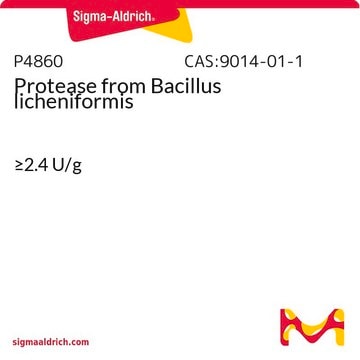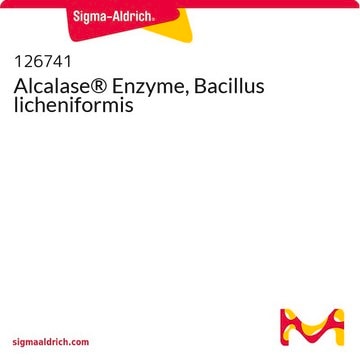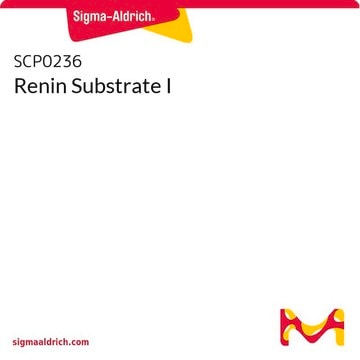R4877
Rennin from calf stomach
≥20 units/mg protein
Sinónimos:
Chymosin
Iniciar sesiónpara Ver la Fijación de precios por contrato y de la organización
About This Item
Productos recomendados
form
lyophilized powder
Quality Level
specific activity
≥20 units/mg protein
purified by
crystallization
composition
Protein, ≥40%
storage temp.
−20°C
¿Está buscando productos similares? Visita Guía de comparación de productos
Application
Rennin, also known as chymosin, is a milkclotting acid proteinase produced in the stomach of a calf. It is used in cheesemaking and to study neonatal gastric digestion .
Biochem/physiol Actions
Rennin, a 323 amino acid chain, is secreted as an inactive precursor which is then converted into an active enzyme through limited proteolysis. It cleaves the peptide bond between phenylalanine and methionine in K-Casein.
Packaging
Package size based on protein content
Unit Definition
One unit will coagulate 10 mL of milk per min at 30 °C.
Physical form
Lyophilized powder containing sodium chloride
Analysis Note
Protein determined by biuret.
signalword
Danger
hcodes
Hazard Classifications
Eye Irrit. 2 - Resp. Sens. 1 - Skin Irrit. 2 - STOT SE 3
target_organs
Respiratory system
Storage Class
11 - Combustible Solids
wgk_germany
WGK 3
Elija entre una de las versiones más recientes:
Certificados de análisis (COA)
Lot/Batch Number
¿No ve la versión correcta?
Si necesita una versión concreta, puede buscar un certificado específico por el número de lote.
¿Ya tiene este producto?
Encuentre la documentación para los productos que ha comprado recientemente en la Biblioteca de documentos.
Los clientes también vieron
Kirsten Kastberg Møller et al.
Journal of agricultural and food chemistry, 60(21), 5454-5460 (2012-05-09)
Bovine chymosin constitutes a traditional ingredient for enzymatic milk coagulation in cheese making, providing a strong clotting capacity and low general proteolytic activity. Recently, these properties were surpassed by camel chymosin, but the mechanistic difference behind their action is not
Xin-ping Li et al.
Xi bao yu fen zi mian yi xue za zhi = Chinese journal of cellular and molecular immunology, 28(7), 715-717 (2012-07-10)
To optimize the prochymosin (pCHY) gene codons and express the gene in Escherichia coli (E.coli), and to prepare its antiserum and detect chymosin protein specifically. According to codon usage bias of E.coli, prochymosin gene sequence was synthesized based on the
Neil D Rawlings et al.
Nucleic acids research, 40(Database issue), D343-D350 (2011-11-17)
Peptidases, their substrates and inhibitors are of great relevance to biology, medicine and biotechnology. The MEROPS database (http://merops.sanger.ac.uk) aims to fulfil the need for an integrated source of information about these. The database has hierarchical classifications in which homologous sets
X P Jiang et al.
World journal of microbiology & biotechnology, 28(5), 2087-2093 (2012-07-19)
Chymosin can specifically break down the Phe105-Met106 peptide bond of milk κ-casein to form insoluble para-κ-casein, resulting in milk coagulation, a process that is used in making cheese. In this study, in order to obtain an alternative milk coagulant which
Jung-Feng Hsieh et al.
Journal of agricultural and food chemistry, 60(8), 2039-2045 (2012-02-07)
Chymosin-induced coagulation of individual milk proteins during incubation at 30 °C was investigated using a proteomic approach. The addition of chymosin (0.006 units/mL) caused the milk proteins to coagulate after a 3 h incubation period. Approximately 88% of the milk
Nuestro equipo de científicos tiene experiencia en todas las áreas de investigación: Ciencias de la vida, Ciencia de los materiales, Síntesis química, Cromatografía, Analítica y muchas otras.
Póngase en contacto con el Servicio técnico









